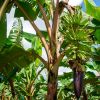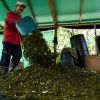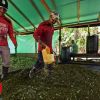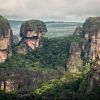-
 +4 +1
+4 +1Colombia wants to deport 70 cocaine hippos who won’t stop breeding
Colombia's proposed plan would send at least 70 hippos that live near drug lord Pablo Escobar's former ranch to India and Mexico.
-
 +4 +1
+4 +1How Colombia plans to handle Pablo Escobar's ranch runaway hippo problem
The hippos, descendants of four imported from Africa illegally by the late drug lord in the 1980s, have spread far beyond the Hacienda Napoles ranch and are a biodiversity problem.
-
 +17 +1
+17 +1Peace accord in Colombia leads to discovery of new dinosaur species
Researchers dubbed it Perijasaurus lapaz after the mountainous region and the Spanish word for “peace.”
-
 +3 +1
+3 +1Colombia elects first leftist president and first Afro Colombian female vice president
Gustavo Petro, a former member of the M-19 guerrilla movement, won the presidency Sunday, and Francia Marquez will be the first Afro Colombian vice president.
-
 +12 +1
+12 +1Colombia shares unprecedented images of treasure-laden wreck
Colombia's army has shared unprecedented images of the legendary San Jose galleon shipwreck, hidden underwater for three centuries and believed to have been carrying riches worth billions of dollars in today's money.
-
 +3 +1
+3 +1‘I was terrified’: the vet sterilizing Pablo Escobar’s cocaine hippos
When Gina Paola Serna studied to become a biologist and veterinarian in Colombia, she never expected to one day be tasked with neutering an invasive herd of hippos that once belonged to Pablo Escobar.
-
 +26 +1
+26 +1Colombia Is Considering Legalizing Its Massive Cocaine Industry
A new bill in congress suggests the government buys up and sells cocaine.
-
 +13 +1
+13 +1Prehistoric Rock Art Depicting Now-Extinct Animals Discovered in Colombia
One year ago, a team of British-Colombian researchers that was funded by the European Research Council came upon a remarkable discovery in the Serranía de la Lindosa, an extremely remote part of the Colombian Amazon. The discovery is a remarkably monumental example of prehistoric art: a nearly eight-mile stretch of paintings of both humans and mysterious animals that spans a steep cliffside, and which has been referred to as the “Sistine Chapel of the ancients.”
-
 +5 +1
+5 +1Colombia was the deadliest place on Earth for environmental activists. It’s gotten worse.
More than 40 human rights defenders and community leaders have been killed in Colombia since January, according to Indepaz, a Colombian peace-building nonprofit.
-
 +2 +1
+2 +1Pablo Escobar's hippos have become an invasive species in Colombia
In the early 1980s, infamous drug lord Pablo Escobar created a family zoo full of exotic animals in Colombia, including rhinos, giraffes, zebras and hippos. When Escobar's empire crashed in the '90s, the animals were relocated to zoos -- except for the four hippos, now considered an invasive species whose waste is wreaking havoc on the Colombian aquatic ecosystem, according to a new study published in the journal Ecology.
-
 +14 +1
+14 +1Colombia Orders Uber To Halt Services
Colombia Orders Uber To Halt Services
-
 +29 +1
+29 +1Uber is getting kicked out of Colombia
Uber had more than 2.3 million users and worked with 88,000 drivers in Colombia.
-
 +4 +1
+4 +1The banana is one step closer to disappearing
A fungus that devastates banana plants has now arrived in Latin America, the Colombian government confirms.
-
 +18 +1
+18 +1Inside Colombia’s beloved candy factory.
For nearly 50 years, Bon Bon Bums have been produced in the Colombina factory in La Paila, north of Cali. At the start, 20 workers were responsible for the production of four million lollipops per month. Today, in that same factory, 200 workers produce more than 40 times as many.
-
 +10 +1
+10 +1UN says coca cultivation hit new high in Colombia last year
Colombia’s acreage of coca, the raw material for cocaine, expanded 17 percent to hit a new record last year, the United Nations said on Wednesday, as the government mulls whether to restart aerial fumigation with the herbicide glyphosate. The total area of the Andean nation under coca cultivation increased to 171,000 hectares (422,550 acres) by the end of 2017, according to the United Nations Office on Drugs and Crime, due to increased productivity and growers eager to expand in the hope of getting more aid to switch to legal crops.
-
 +12 +1
+12 +1The flow of refugees fleeing Venezuela is about to become a tidal wave
The estimated 1 million Venezuelan refugees who have flooded Colombia alone in recent years is expected to double over the next year there and in other Latin American countries.
-
 +15 +1
+15 +1Drones hunt cocaine in Colombia
The Colombian government has started to use drones to destroy the plants that produce cocaine. Small aircraft loaded with herbicide are being sent to search for illegal fields of coca. President Iván Duque has favoured the use of the unmanned aircraft to ensure that damage to neighbouring crops is kept to a minimum.
-
 +11 +1
+11 +1Colombians warned it’s too hot to have sex
Colombians have been warned not to have sex because it is too hot. Health officials in a coastal city issued the recommendation for people trying to remain cool during an intense heatwave. Santa Marta city health secretary Julio Salas’s comments have been keenly debated after he called for residents of the Caribbean tourist hotspot to forego sex during the daytime.
-
 +9 +1
+9 +1Colombia has billions in sunken treasure lying off its coast. But who owns it?
Sitting at the bottom of the ocean, just off Colombia’s coast, is one of the hemisphere’s richest treasures: a Spanish galleon packed with billions of dollars worth of New World gold, silver and emeralds. The fight over who will profit from the San José shipwreck and its precious cargo — thought to be worth between $4 billion and $17 billion — has dragged on for almost four decades amid legal challenges and allegations of back-stabbing, international espionage and unbridled greed.
-
 +19 +1
+19 +1World’s largest protected rainforest declared in Colombia
Colombia’s Serrania del Chiribiquete has been declared the world’s largest tropical rainforest national park following decades of efforts by environmental experts and conservationists. The park, which is home to nearly 3,000 animal and plant species, has been expanded by more than 50 per cent – an area equivalent to the size of Northern Ireland. Its forests provide a home to rare and iconic species including jaguars, manatees and vulnerable brown woolly monkeys.
Submit a link
Start a discussion




















